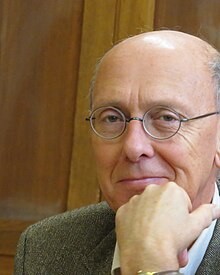Jonathan Dancy
Jonathan Dancy | |
|---|---|
 Dancy in 2013 | |
| Born | Jonathan Peter Dancy 8 May 1946 |
| Spouse |
Sarah Birley (m. 1973) |
| Children | 3, including Hugh |
| Era | Contemporary philosophy |
| Region | Western philosophy |
| School | Analytic |
Main interests | Moral theory |
Notable ideas | Moral particularism |
Jonathan Peter Dancy FBA (born 8 May 1946) is a British philosopher, who has written on ethics and epistemology. He is currently Professor of Philosophy at University of Texas at Austin and Research Professor at the University of Reading. He taught previously for many years at the University of Keele.
Education and career
[edit]Dancy is the son of John Christopher Dancy.[1] He was educated at Winchester College, where he was Head Boy and played cricket for the school, and Corpus Christi College, Oxford, where he obtained a double first in classics (1965–7: Classical Honour Moderations: First Class Honours; 1967–9: Literae Humaniores: First Class Honours, BA).[2]
After graduating he served as a lecturer at Pembroke College, Oxford for a year. In 1971 he became a lecturer at Keele University, becoming professor there in 1991.[2]
After his daughter-in-law, American actress Claire Danes, mentioned him during an appearance on The Late Late Show with Craig Ferguson, Dancy appeared as a guest on the programme on 1 April 2010.[3]
He was elected a Fellow of the British Academy in 2016.[4]
Philosophical work
[edit]After having worked on problems of epistemology, and more particularly on the nature of perception (argument from illusion), he emerged as the leading proponent in ethics of moral particularism, the idea that all moral reasons are particular and context-sensitive, rather than general.
Dancy also defends what he calls the holism of reasons, namely the idea that a consideration that is a reason for acting in a certain way in one case may not be a reason for acting in that way, or even a reason for not acting in that way, in other cases. In this sense, reasons are context-dependent. Dancy argues that the holism of reasons provides a major support for the main claim of his particularism, i.e., that there are no moral principles but that morality can get on perfectly well without them. Dancy edited some of George Berkeley's writings[5] and dedicated a book to the Anglo-Irish thinker.[5]
Personal life
[edit]In 1973 he married Sarah Birley; they have three children: the actor Hugh Dancy; Jack Dancy, who runs a travel company; and Kate Redman, who works for UNESCO.
Selected publications
[edit]Articles
[edit]- "On Moral Properties", Mind, 1981, XC, pp. 367–385.
- “Ethical Particularism and Morally Relevant Properties.” Mind, n.s.; 92, 368 (Oct., 1983): 530 – 547.
- “The Role of Imaginary Cases in Ethics.” Pacific Philosophical Quarterly, 66 (1985): 141 – 153.
- “An Ethic of Prima Facie Duties.” In A Companion to Ethics, ed. Peter Singer. Oxford: Blackwell Publishing, 1991. 219 – 229.
- “Can a Particularist Learn the Difference Between Right and Wrong?” In The Proceedings of the Twentieth World Congress of Philosophy, vol. 1, ed. K. Brinkmann. Bowling Green, OH: Philosophy Documentation Center, 1999. 59 – 72.
- Dancy, Jonathan (July 2000). "Intention and permissibility: Jonathan Dancy". Aristotelian Society, Supplementary Volume. 74 (1): 319–338. doi:10.1111/1467-8349.00074.
- See also: Scanlon, T.M. (July 2000). "Intention and permissibility: T. M. Scanlon". Aristotelian Society, Supplementary Volume. 74 (1): 301–317. doi:10.1111/1467-8349.00073. Pdf.
- “The Particularist’s Progress.” In Moral Particularism, ed. Brad Hooker and Margaret Olivia Little. Oxford: Clarendon Press, 2000. 130 – 156.
- "Moral Particularism" in the Stanford Online Encyclopedia of Philosophy
Books (author)
[edit]- An Introduction to Contemporary Epistemology, Oxford: Blackwell, 1985.
- Berkeley: An Introduction, Oxford: Blackwell, 1987.
- Moral Reasons, Oxford: Blackwell Publishing, 1993.
- Practical Reality, Oxford: Oxford University Press, 2000.
- Ethics Without Principles. Oxford: Clarendon Press, 2004.
- Practical Shape. A Theory of Practical Reasoning, Oxford: Oxford University Press, 2018.
Books (editor)
[edit]- Perceptual Knowledge, Oxford: OUP, 1988.
- Reading Parfit, Oxford : Blackwell,1997.
- Normativity (Ratio conference 1998) Oxford : Blackwell, 2000.
- Philosophy of Action: An Anthology (with Constantine Sandis) Oxford : Wiley-Blackwell, 2015.
References
[edit]- ^ "Jonathan Dancy". What Is It Like to Be a Philosopher?.
- ^ Jump up to: a b "Jonathan Dancy". Archived from the original on 4 March 2016. Retrieved 16 January 2015.
- ^ Jonathan Dancy - Claire Danes' Father In Law, The Moral Philosopher - His Only Appearance [720p] on YouTube
- ^ "British Academy announces new President and elects 66 new Fellows". 15 July 2016.
- ^ Jump up to: a b Parigi, Silvia. "Berkeley Bibliography (1979-2010)". Archived from the original on 3 July 2013.
External links
[edit]- Jonathan Dancy faculty page on the University of Texas at Austin Department of Philosophy website
- "Moral Particularism" – Dancy's article in the Stanford Encyclopedia of Philosophy
- Autobiographical interview with Dancy – What Is It Like to Be a Philosopher?
- "Jonathan Dancy on Moral Particularism" – an episode of the Philosophy Bites podcast
- Academics of the University of Reading
- Academics of Keele University
- Alumni of Corpus Christi College, Oxford
- University of Texas at Austin faculty
- Analytic philosophers
- English philosophers
- 20th-century British philosophers
- 21st-century British philosophers
- British epistemologists
- George Berkeley scholars
- 1946 births
- Living people
- People educated at Winchester College
- Presidents of the Aristotelian Society
- Fellows of the British Academy
